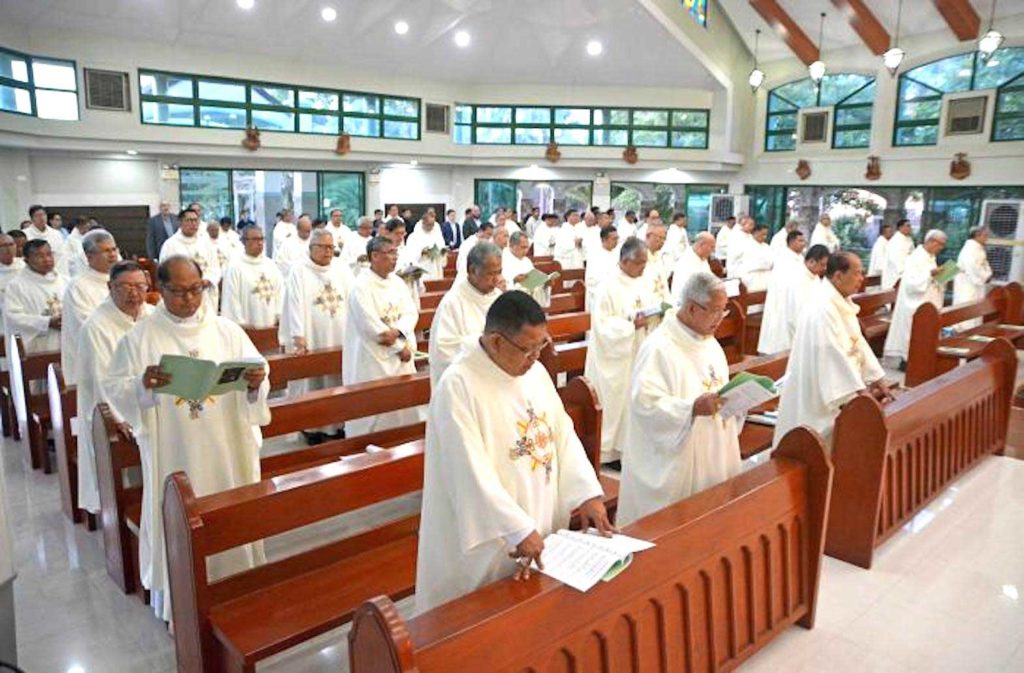CBCP 76 years ago

Members of the Catholic Bishops of the Philippines Conference. CBCP
Jose Cardinal Advincula, the new Archbishop of Manila, is the one and only active cardinal-member of the Catholic Bishops’ Conference of the Philippines (CBCP), which is presently composed of 86 other active archbishops and bishops, two diocesan administrators, and 41 honorary members, including retired Cardinals Guadencio Rosales and Orlando Quevedo. After his appointment to the Roman Curia in 2019 (serving the Universal Church), Cardinal Tagle is no longer a member of the CBCP and is serving the local Church).
From 1565 to 1945, a rather long period of 380 years, remember, there was no CBCP but only individual bishops. During the Japanese Occupation, Salesian Archbishop Guglielmo Piani, the Apostolic Delegate to the Philippines, and a few bishops went around and saw for themselves the ugly face of the worst urban fighting in the entire Pacific that made Gen. Dwight Eisenhower (1890-1969) lament, “This is the worst destruction I have ever seen,” with the exception of Warsaw, Poland.
This is how the Catholic Welfare Organization (CWO), the future CBCP, was born. Seventy-six years ago, the bishops from dioceses across the archipelago met and accepted the challenge to group together as an emergency-response team working at the intersection of war and hunger, meant to raise the Filipino’s drooping spirit and lessen the negative impact of war in the country.
There was Manila auxiliary Bishop César María Guerrero, along with Archbishop Gabriel Reyes of Cebu, Bishops Alfredo Verzosa of Lipa, Mariano Madriaga of Lingayen, Constancio Jurgens of Tuguegarao, Santiago Sancho of Nueva Segovia, and others. Not to forget, there was Fr. John Hurley, SJ, a.k.a. “Father Mercy,” who was audacious enough to face and resist all Japanese attempts to confiscate the Ateneo de Manila University property.
Seventy-six years ago, this group of brave men visited the internment camp at the University of Santo Tomas, scouted the place, and saw a ridiculously small space. They told themselves: Well, we could transform that ridiculously small space into a temporary makeshift CWO office. There they asked themselves the big question: How do we show the beautiful Face of God before a hopeless population?
Seventy-six years ago, there was no progressive, moderate, or any conservative bishop among them. Our shepherds were one and united.
Seventy-six years ago, every bishop was a jack of all trades and a master of both prophetic and pastoral duties, a talking and walking doer who was wearing several “heavy-and-serious” hats and always on an emergency call.
Today, the CBCP is as important to the Filipino nation as 76 years ago on two accounts. First off, as we commemorate the 500 YOC, the bishops are de facto pastoral leaders of the Filipino Church, which, in the words of Pope Francis, “stands among the great Catholic nations in the entire world” from whom the Filipino people look for guidance.
Pope St. Paul VI once said that as a great Catholic nation in South-East Asia, “you are truly ‘a city set on a mountain (which) cannot be hidden… A lamp put upon a lampstand, so as to give light to all’ (Matthew 5:15). Consider how great is your responsibility to give good example to those of other faiths, and thus sweetly draw men to the Heart of Jesus.”
Secondly, with Covid-19 (and its Delta variant) and the present administration (2016-2022) silencing the Church with evil forces of the worst consequences, the CBCP now faces a formidable challenge of doing its missio ad gentes, that is, of being a Church “gifted to give.” For one, due to the pandemic, only a few souls out of the 80 million Catholics are able to regularly receive the Sacraments and actively participate in the liturgical life of the Church.
It is now an emergency task for our bishops to live the orthopraxis of the actual evangelization-development mission that is founded on orthodoxy of the Catholic social teachings and ultimately based on the words and deeds of Jesus, who did not only forgive sins, for He cured the sick, consoled those in mourning, and fed the hungry.
To the newly elected CBCP officers, our utmost congratulations and prayers.
Jose Mario Bautista Maximiano (jomaximiano@gmail.com) is the author of THE SIGNS OF THE TIMES and the Social Doctrine of the Church: An Epistemology (Salesiana, 1991) and THE CHURCH CAN HANDLE THE TRUTH (Claretian, 2017).

